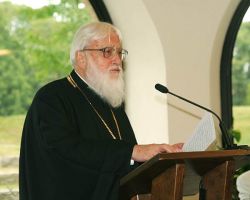Lecture by Kallistos Ware
Lecture by KALLISTOS WARE
Metropolitan of Diokleia
By becoming a living flame of prayer the solitaries transform the world around them by their very existence, by the sole fact of their secret presence
KALLISTOS WARE,
Metropolitan of Diokleia
'The Kingdom of heaven suffers violence….'
'The kingdom of heaven', says Christ, 'suffers violence, and it is the violent who take it by force' (Matthew 11 : 12). These are words that apply in a particularly direct way to the life of the solitary. We human beings are created by God in His own image and likeness (Genesis 1 : 26-27. We are created, that is to say, in the image of the Holy Trinity, according to the likeness of a God who is not only one but one-in-three, of a God who is mutual love. We are ikons of a God whose being is relational being, a God who is social and communal, albeit in a manner infinitely transcending all human society and community. Humans, therefore, fashioned as they are in the image of this Triune Deity, are created for relationship and for mutual love and service. They are created as members of a single body, and it is precisely this interdependence that is reaffirmed in the life of the Church (1 Corinthians 12: 12-27; Ephesians 4: 25). The very word for 'person' in the Greek language, prosopon, underlines the same point; for it means literally 'face' or 'countenance'. I am not truly a person unless I face others, looking into their eyes and allowing them to look into mine.
If all this is true, does it not follow that the solitary life contradicts what it means to be a person in the Trinitarian divine image? Is not life in solitude an act of violence against the relational character of our human nature? This is something that especially disturbs St Basil the Great. 'Who does not know', he protests, 'that man is a tame and sociable animal, not solitary and wild?' For 'solitary' Basil uses here the word monastikon, meaning 'monastic'. 'Nothing', he continues, 'is so characteristic of our nature as to associate with one another, to need one another, and to love our own kind.' What disturbs Basil is the fact that the solitary lacks the opportunity to display towards others the practical compassion that is fundamental to our humanness. 'Whose feet will you wash,' Basil asks, 'whom will you look after, how can you be last of all, if you live by yourself?'
It should not be concluded, from Basil's words, that he was opposed on principle to the solitary life. On the contrary, according to St Gregory of Nazianzos, Basil strove to reconcile and unite the communal and the eremitic life by founding cells for anchorites not far from his cenobitic houses. And here, indeed, we may find the beginnings of an answer to the difficulties that Basil raises. Solitude and communion, it may be argued, are not mutually exclusive. They are interdependent and complementary. This is a truth that Cicero emphasizes when he speaks of himself as 'never less alone that when he is alone' (nec minus solum quam cum solus esset). A person, in other words, may be alone in the sense that he is not in the immediate company of others; and yet, if he lives an intense and creative life of the Spirit, in the depths of himself he discovers an unbroken bond of communion with others. Seclusion does not necessarily signify isolation, nor does solitude imply loneliness and vacancy. Our fellow humans may be physically absent, but they are spiritually present. Communion can exist on many different levels. From the Christian desert, Evagrios of Pontos makes the same point when he says that the monachos – by which he means perhaps not just the monk but the solitary – is ‘separated from all and united to all’. This describes exactly the situation of anchorite, whether man or woman. She or he is 'separated from all' externally, in spatial or topographical terms, but inwardly and spiritually he or she is united to all through prayer.
